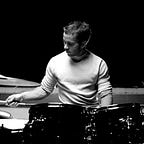Drills, Drum Sticks, and the Fulcrum
Luckily, I never cut my finger off like the guy in the story below….. But, I did end up injuring my hand for five months because of a lack of concentration and loss of my fulcrum. I was using an impact driver (a more powerful drill) while prototyping some drum sticks a few months ago and accidentally had a momentary lapse of focus and slammed my thumb extremely hard with the tool. After a month of an excruciating blood blister build up under my nail, I lost my thumb nail completely and spent the next three months regrowing it while having to deal with an infection….. not so much fun. I was completely out of commission from playing for four months, giving me plenty of time to think about the consequences of my actions.
Let’s back up a bit…
(wood shop teacher) “I cannot stress enough how important it is that you keep your fulcrum firm, in control, and relaxed. When you move your wrist, you must be conscious to keep it in line with your forearm so that you can maintain control throughout the motion. You must be constantly focused on your grip so that you maximize the efficiency of motion.”
(student) “What do I do with my fingers? They always seem to slip off when I move my hand downwards”
(teacher) “Never allow your fingers to come off. You will lose all control and efficiency of motion and it is dange………
(student) “Ahhhhhh #@$% (chops off finger with the circular saw)
(teacher) “Now you see why I stressed the importance of maintaining your fulcrum….”
Does this story above sound familiar? Have you had lessons where the teacher explains the importance of the fulcrum, but neglects to share WHY it is even important? Sure, as drummers and percussionists we all know how important our grip is. It allows us to perform at a very high level without having to constantly re-adjust when we play different instruments, styles, and dynamics. Without a consistent fulcrum we would be all limited in what musical choices we can create.
Here is one definition of the fulcrum in a familiar context, the see-saw:
“The point on which a lever rests or is supported and on which it pivots.”
Here is a much different definition:
“A thing that plays a central or essential role in an activity, event, or situation”
Clearly these definitions describe different aspects of the fulcrum. Of course the former is important, but what most percussionists fail to keep in context is the latter definition. The fulcrum is THE essential role in creating sound. Without it, percussionists lose control over the most nuanced aspects of their playing including note accuracy, phrasing control, and intended playing zones on their instrument.
The story in the beginning of this article regarding my fulcrum is an over-exaggerated dialogue that I had with our in-house product engineer, Corey Smith. When I was first learning how to use power tools such as a miter saw, dremel, and impact drivers, the first thing that Corey told me was, “never let your grip get so relaxed that I can pull the tool from your hand without much effort.”
I should have listened to Corey about maintaining my fulcrum.
Throughout the following months while my nail was regrowing, I was forced to rewire my body to do everything with my left hand. I started to appreciate during the next few months how important the fulcrum is in establishing a grounding for being efficient, and more importantly how disastrous the consequences were if I got lazy with it.
I thought back to times when my teachers at Juilliard would tell me, “keep your fulcrum relaxed but firm so that you have total control over your sound production”, but it never really dawned on me how important this was at the time. Usually, the fulcrum is mentioned on the first few lessons, and after that the teacher and student dive into complex musical ideas and sound concepts. Because of this added complexity on top of the basic foundation, the fulcrum becomes a second priority to the music. It is assumed that because it was mentioned once in a beginning lesson that it will stay a permanent part of the musician’s foundation while other music ideas are added on top of it…. But we all know that’s not how it really works. We never really see the true consequence of our actions when we accidentally lose our fulcrum. It becomes one of those extra bonuses as long as the musical idea executed successfully. It’s from witnessing the extreme importance of the fulcrum in the fabrication world that has truly given me a different perspective on how crucial it is to maintain the focus and concentration to our fulcrum. The fulcrum doesn’t just allow us control, it is the foundation to allow us to let go while we perform and not let small errors such as un-even hands and bad rhythm distract the listener. If we begin to view our fulcrum with more potential consequences that can hinder our musicianship, then the overall level of our musicianship can match our potential.
